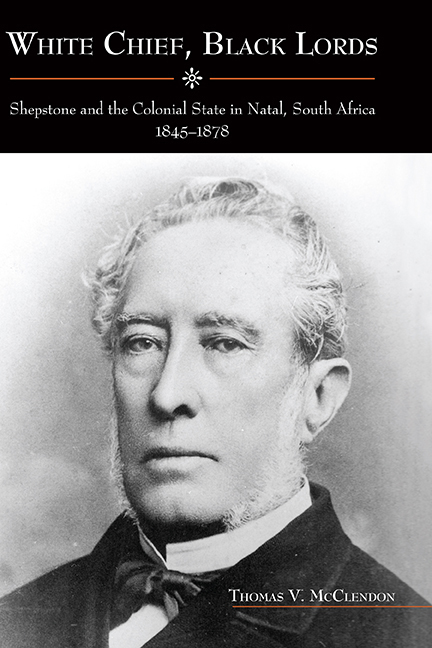Book contents
- Frontmatter
- Dedication
- Contents
- List of Illustrations
- Acknowledgments
- List of Abbreviations
- 1 Introduction
- 2 The Man Who Would Be Inkosi
- 3 Witchcraft and Statecraft
- 4 You Are What You Eat Up
- 5 Guns, Rain, and Law
- 6 From Show Trial to Shallow Reform
- 7 Conclusion
- Notes
- Glossary
- Bibliography
- Index
- Rochester Studies in African History and the Diaspora
3 - Witchcraft and Statecraft
Published online by Cambridge University Press: 09 May 2017
- Frontmatter
- Dedication
- Contents
- List of Illustrations
- Acknowledgments
- List of Abbreviations
- 1 Introduction
- 2 The Man Who Would Be Inkosi
- 3 Witchcraft and Statecraft
- 4 You Are What You Eat Up
- 5 Guns, Rain, and Law
- 6 From Show Trial to Shallow Reform
- 7 Conclusion
- Notes
- Glossary
- Bibliography
- Index
- Rochester Studies in African History and the Diaspora
Summary
It would be productive of no good result suddenly to abrogate the laws and usages they have practiced from time immemorial except such as are connected with their ideas of witchcraft.
Report of the Locations Commission, in Correspondence Relative to the Establishment of the Settlement of Natal (1848)Umthakath’ akancengwa (A wizard is not begged).
C. L. Sibusiso Nyembezi, Zulu ProverbsIn the winter of 1851, five years into his tenure as the top official with responsibility for ruling the African population in Natal Colony, Theophilus Shepstone ordered a moratorium on “witchcraft cases” until the lieutenant governor could “decide the principle on which they are to be treated.” The following month, Shepstone wrote a longer memorandum on this subject, dividing witchcraft cases into two types: (1) poisoning, and (2) the use of “charms” to cause the death of another. He noted that under “their own law,” Africans in the region punished those found guilty of witchcraft by imposing a sentence of death and confiscation of property—the confiscation being known as “eating up.” Colonial policy, by contrast, had been to punish those “proved or admitted” to have committed acts of witchcraft by the imposition of a fine and removal to a different locality. Shepstone noted, on the other hand, that the “evidence of witch doctors, men supposed to have the power of ‘smelling out’ or knowing who the culprits are … has however universally been rejected” by colonial adjudicators.
He wondered whether colonial officials should continue to reject the evidence of the smellers-out of evildoers, or whether a “new principle” he proposed (unfortunately not disclosed in either memo) should be applied. Four years later, a three-way standoff emerged among the colonial government, a mission station, and an inkosi over how to deal with three men accused of ubuthakathi who had fled to the mission station. Not wishing to comply with a magistrate's order that the men be removed to another locality, the missionary in charge of the station argued that the expulsion of the accused witches from the mission station would violate “moral and religious principles in regard to the Natives of this District.” Furthermore, he continued, it would in effect constitute a governmental endorsement of “the system of Witchcraft existing among the Natives.”
- Type
- Chapter
- Information
- White Chief, Black LordsShepstone and the Colonial State in Natal, South Africa, 1845–1878, pp. 47 - 61Publisher: Boydell & BrewerPrint publication year: 2010



